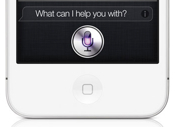
Earlier this week, Microsoft’s research and strategy chief Craig Mundie and other execs spent the day showing reporters some of the company’s latest research in areas including natural user interfaces, machine learning and data analysis.
It was futuristic stuff, and the resulting coverage generated lots of buzz in the outside world even as the event was still going on.
Of course, apart from Microsoft’s Kinect sensor, the consumer product that has captured much of the attention in these areas is Siri, the intelligent assistant for Apple’s iOS.
During the Q&A session that capped the day, one reporter talked about his kid’s fascination with Siri, and pointed out the strength of Apple’s iPad, and asked Mundie how much those things concern him.
It’s a topic that Mundie has touched on in the past, when he pointed out that Windows Phone had voice recognition before Siri — a comment that prompted considerable criticism at the time, from people who noted that Siri’s functionality is superior.
This time, Mundie talked about the issue in a bigger picture. Here’s an extended excerpt from his comments on the topic, echoing some of the statements made earlier in the day by Qi Lu, Microsoft’s online services chief.
“One thing about Microsoft is we compete with everybody these days, it seems. There’s good news and bad news. Integrating these ecosystems together and making sense out of it, that’s going to be an asset. But to do that, you can’t leave a huge gap in any one area. And that’s why we fell in a hole in terms of the phone stuff a couple years ago.

“We had smartphones before the iPhone, and then we just didn’t focus on it — made some errors. And so that one (where) we’ve had to catch up. But there’s a lot of critical acclaim for the Windows Phone now.
“I think if you just look at every device one at a time, you say, alright, at the margin, is Windows Phone a little better, a little worse than an Android or an iPhone on any given day, I’d say, absolutely they’re competitive. There’s no big differences. Some people would actually tell you (Windows Phone) is superior to the iPhone right now.
“But I think it’s a mistake to evaluate us now one product at a time, and ask, well, is Siri on the phone better? Which other Apple products can you talk to? Answer: none. We’re slow and steady, but we’re trying to say, you will be able to talk to our products in a uniform way on the TV, the phone, the personal computer, all of them. It’s harder to do that, but we think that’s important.
“As Qi said, Apple got Siri by buying a company that had focused in a very small number of domains. It’s a bit like Yahoo when they curated the web for you. But eventually the web gets so big it’s hard to curate manually.
“Qi’s point is that they’re on a path which may be really good for a very small number of domains, assuming they can continue to curate it effectively. But we think that you won’t be willing to confine your questions to some set of domains where you might get a good answer, and everything else you get no answer.
“We’re investing in trying to build an infrastructure that essentially uses the machine to inform the machine. Hopefully that will come onstream here and people will see it horizontally across our products, and they’ll see that it isn’t as constrained in terms of where it can answer these questions.”
Agree or disagree, it’s a window into Microsoft’s mindset not only on this specific issue but on many others the company is facing these days.



